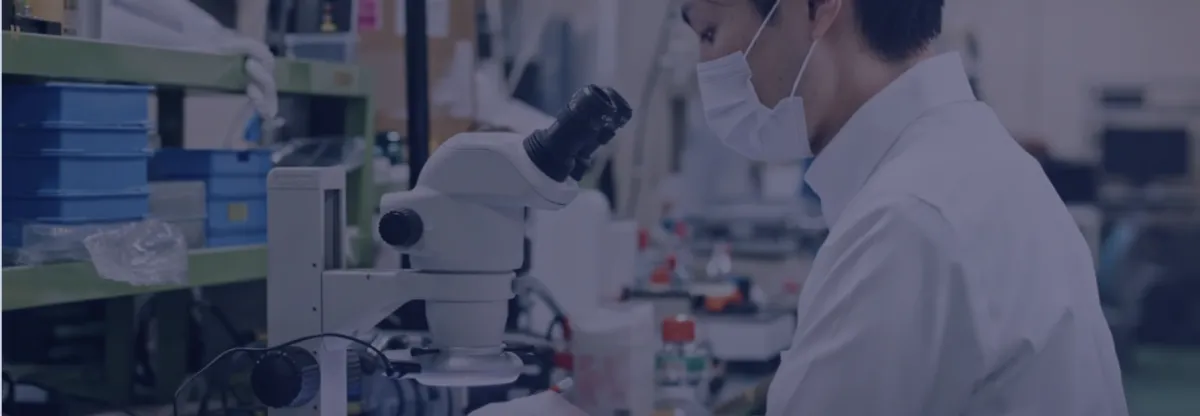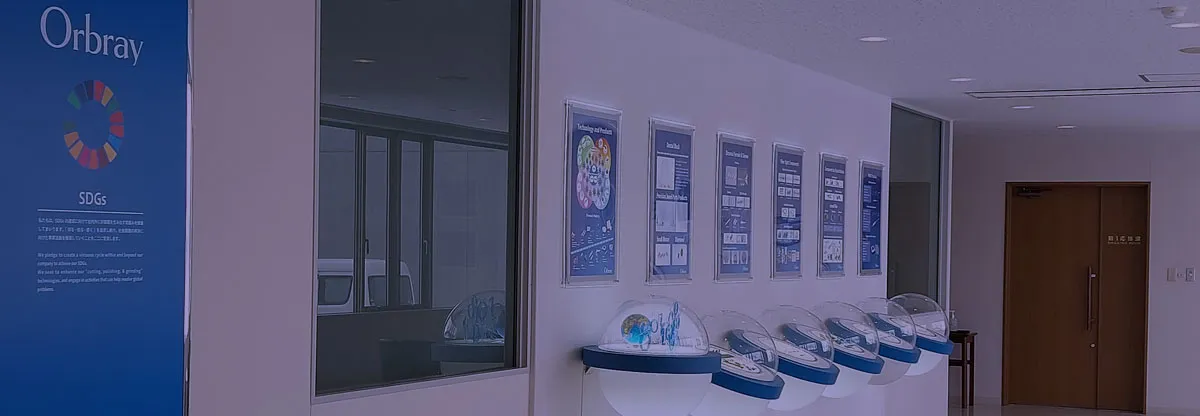Lily Style Interview with Female Entrepreneur Vol.3
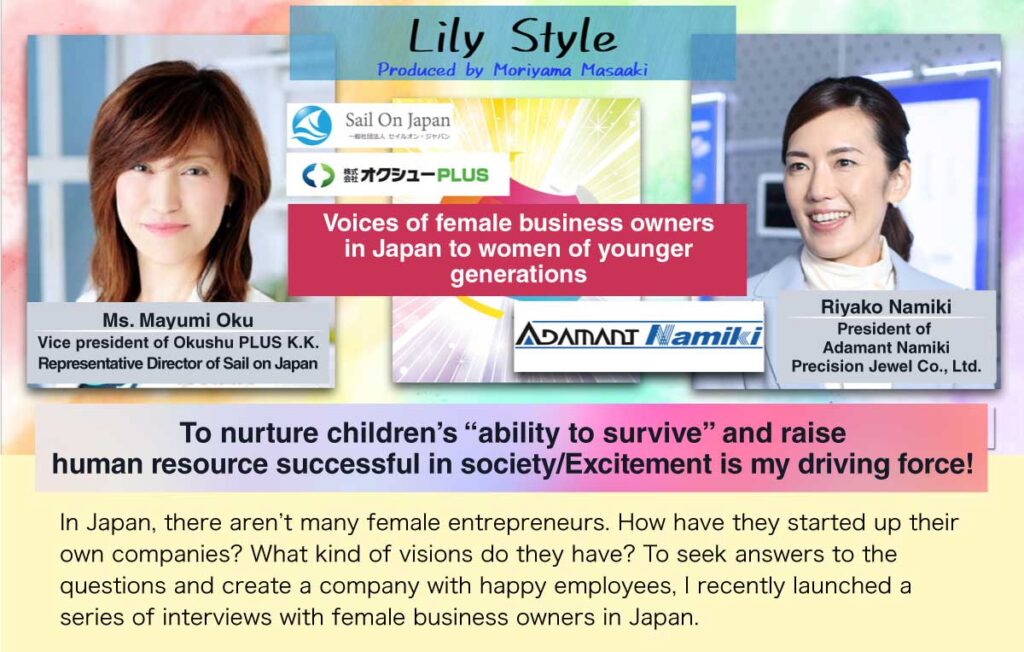
For our third interview, we invited Ms. Mayumi Oku, vice president of Okushu PLUS K.K. in Yokote City in Akita Prefecture, where Orbray Co., Ltd. also has a plant. Ms. Oku engages in a variety of education businesses with the goal of empowering children and developing their ability to survive in a society.
Lily: What does Okushu PLUS K.K. do?
Mayumi: Our company mainly deals with two areas of businesses – energy and education. While being the vice president of Okushu PLUS K.K., I also lead the education sector which manages cram schools, English conversation classes, robot programming and preschool education, targeting at those from kindergartens pupils to university students. I also run an alternative school for truant children and a correspondence high school. Our goal is to develop every child’s ability to survive in a society and offer a variety of kinds of learning.
Lily: I would like to dig deeper in the topic of the education to develop “the ability to survive.” What have you done for this goal?
Mayumi: I used to be a junior high school teacher but I couldn’t get satisfied with the education within the system of schools. So, I quit the job and left for Tokyo to find a way to live who I am. I got a position at a marine business company because I had belonged to a yacht club at my university and had some experience.
The company was about to start a project which combined the ocean, yachting and education. I was a teacher for truant children in their three-month adventurous voyage by a large yacht to a desert island in Micronesia. The number of truant children was growing in those days. We finally reached the island following a dangerous great voyage. We built a house, caught tropical fish and ate wild plants.
We were a team of four adults and 12 children and weathered storms and scorching heat. We were literally on the same boat and shared the goal of surviving the harsh life. When we came back to Japan, children looked completely different to their parents’ eyes. They looked stronger physically and mentally, not just showing their suntanned smiles.
Lily: They learned what they couldn’t have learned at junior high schools. What happened to them after that?
Mayumi: I believe they acquired the ability to make a decision. Some went back to school, and one became a professional surfer. Every child became independent and they are now successful in various areas. The adventure gave them a breakthrough and provided them with an unwavering confidence in themselves. They are now 45 years old or so. Without the experience, they would never have been what they are today, they say.
Lily: When I treat my children and workers at my company, I realize that self-esteem is more important than anything else. I hope employees of my company to be much more proud of their jobs – to manufacture something that can be made only by Adamant Namiki in the world.
Mayumi: You and I have looked at Akita from the outside of the prefecture and we have realized the attractiveness of Akita and Adamant Namiki. However, if we had been only in Akita, we would never have been aware of its strong points. I assume that we, who have found Akita’s strength, should play the role of boosting the region.
Lily: I have a daughter who’s now a third grader of an elementary school. Everyone around her is worrying about cram schools. I suppose there are many people who are worried about similar problems. I have two children preparing for entrance examinations. I think my children should experience as many failures as possible, though they may get angry to hear me saying this. I believe setbacks make them stronger. What is your opinion?
Mayumi: In my view, children who are put on predetermined courses and grow without few troubles will wonder whether they have come through a right path when they grow up and look back. It’s OK to make mistakes and take the long way around. I ask a variety of questions to children and many of them say they can’t answer because they never think deeper. Their parents take a really good care of them and hinder children’s opportunities to ponder. That spoils their ability to make a judgment for themselves. From now on, it will become more important to acquire the ability to manage crisis as well as experience difficulties and adventures.
Lily: What’s a good way to lead them to think for themselves?
Mayumi: At our cram schools, we try not to give students quick answers, though some parents complain about the policy, saying why cram schools avoid teaching answers. We try to keep asking students how they should solve problems. We give them tips for answers and let them think for themselves as much as possible. It would be easier if we gave them quick answers but that wouldn’t nurture children’s ability. It is necessary to be patient and we just need to wait patiently. I’m afraid that parents’ attitudes to “give too much” and “take care too much” are depriving children of opportunities to think for themselves. Entrance examinations will change. From now on, I expect how to find answers to questions without fixed answers will become a major theme of learning.
Following my interview with Ms. Oku, we had a Q&A session and received some questions from our audience. There was a question from a single mother who has a six-year-old child. When the mother helps her child do a homework, she often ends up having a quarrel with her child, who turns sulky. Though Ms. Oku said that children shouldn’t be given quick answers, it isn't easy to do so, the mother said. How should she deal with such situation? In response, Ms. Oku said how to teach depends on each child. It differs depending on age and each child’s character. Some children are pretty dependent while others try to solve problems for themselves. It is important to give them tips and encouraging words. To avoid a quarrel, you need to praise children when they accomplish something, even a small achievement, and say something like “Marvelous!” and “You are a genius!” The actions to praise them will bring changes to them gradually but steadily, Ms. Oku said, adding it is definitely worthwhile to try.
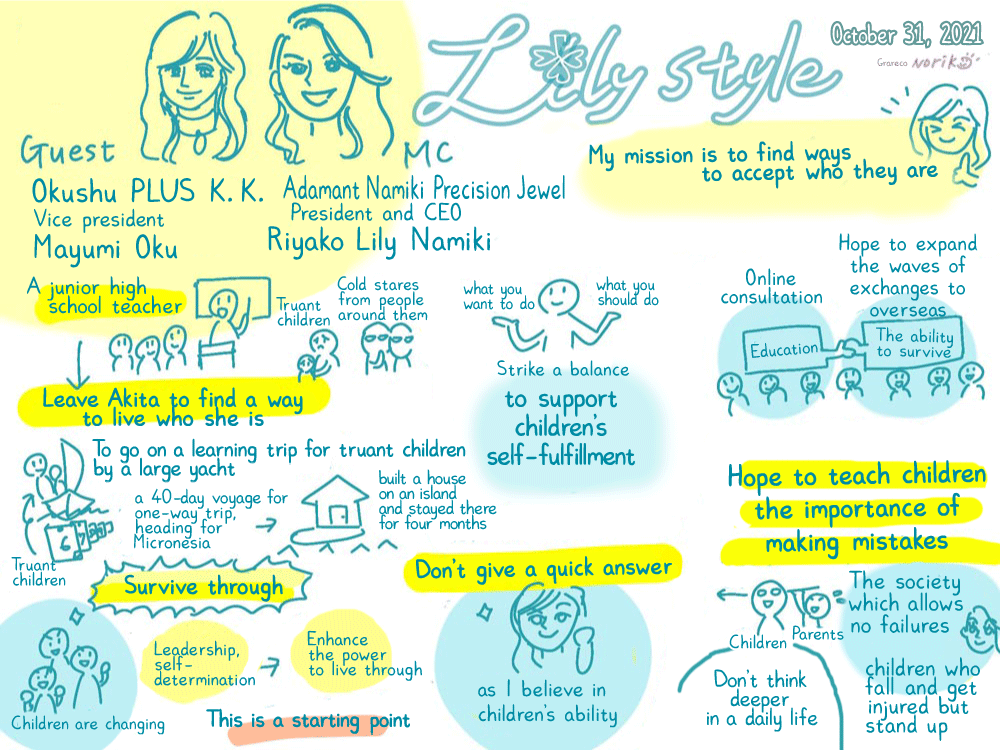
-
Lily Style: Interview with Female Entrepreneur in Japan vol.01 President and CEO, Riyako Namiki
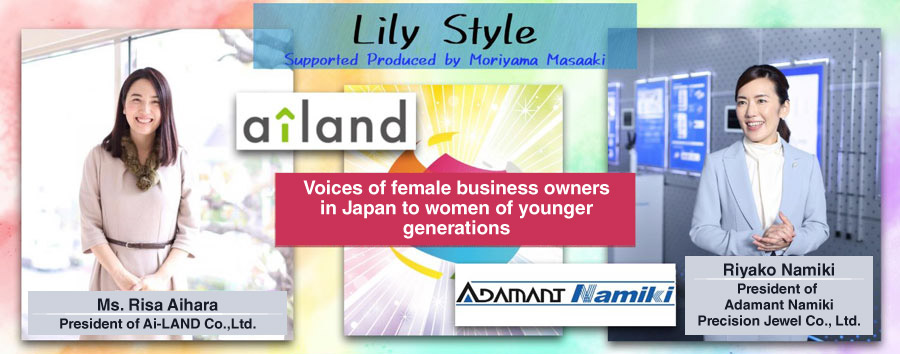
-
Lily Style: Interview with female entrepreneurs
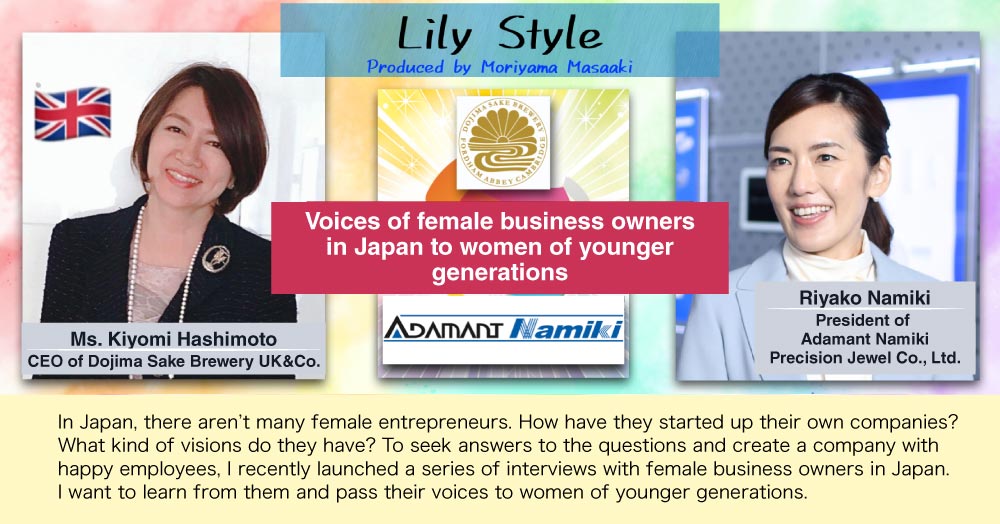
Vol. 5 President and CEO, Riyako Namiki -
Lily Style Interview with Female Entrepreneur in Japan Vol. 4
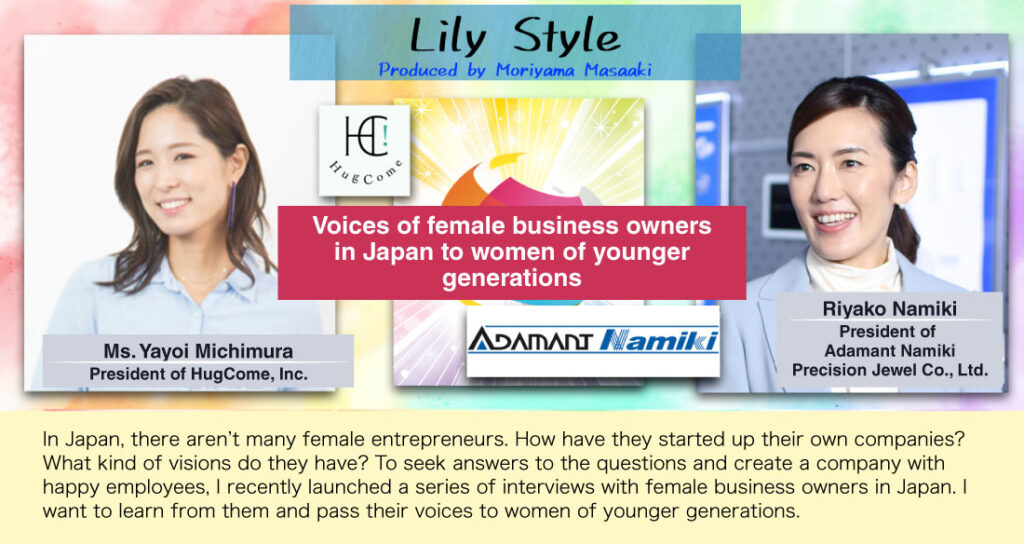
-
Interview article of our President Riyako Namiki appeared in Newsweek International and the Worldfolio website.
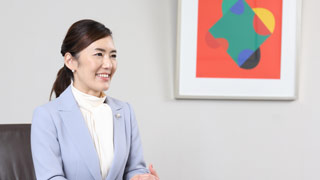
-
Lily Style: Interview with Female Entrepreneur Vol. 6 Ms. Mai Papillon, Head of Energy Station
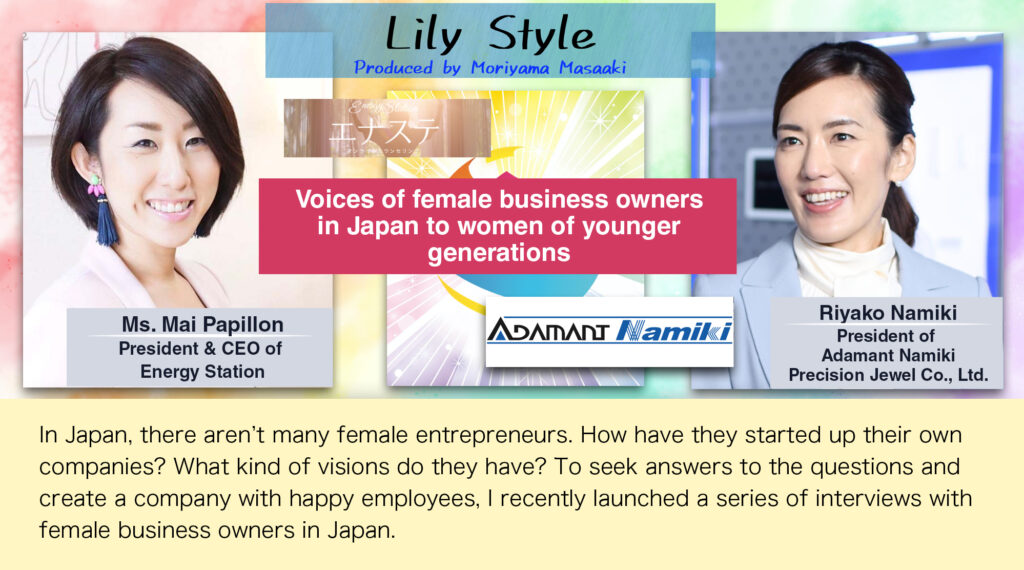
-
Lily Style: Interview with Female Entrepreneur in Japan vol.2
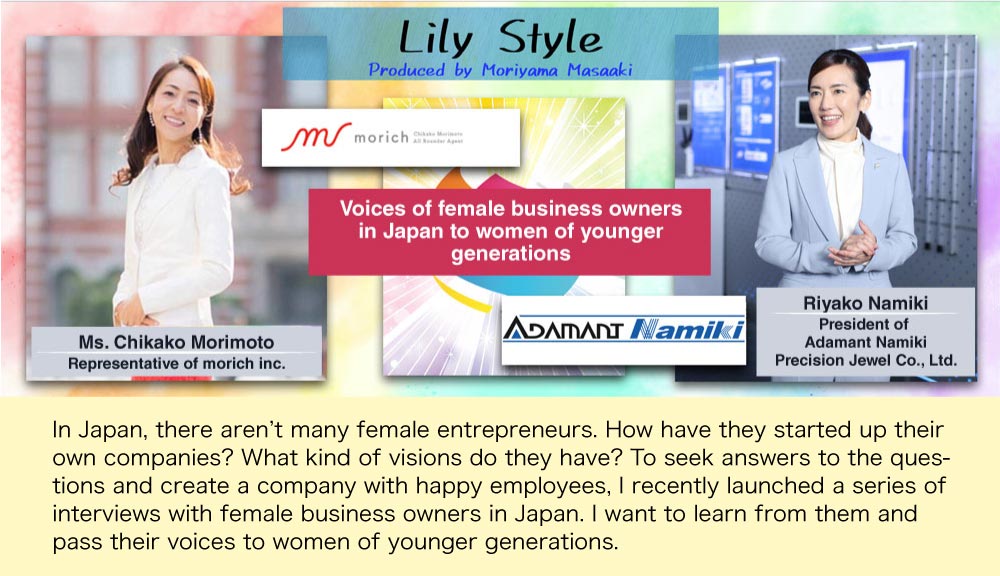
By Riyako Lily Namiki, President and CEO
